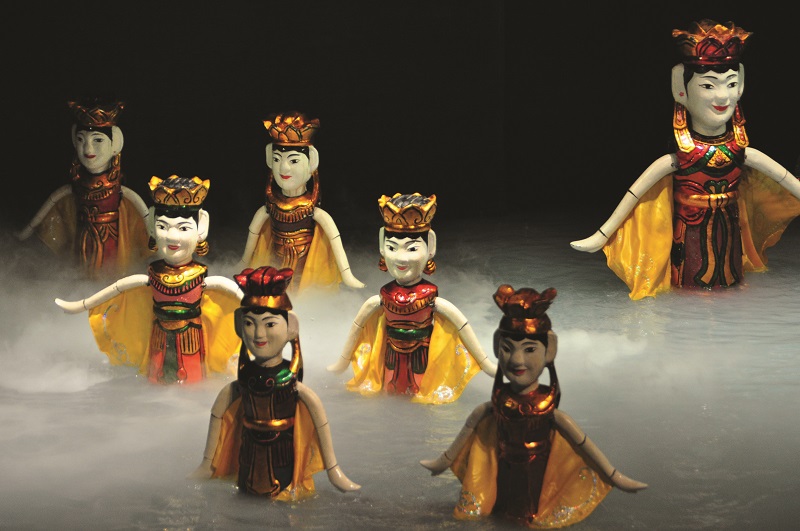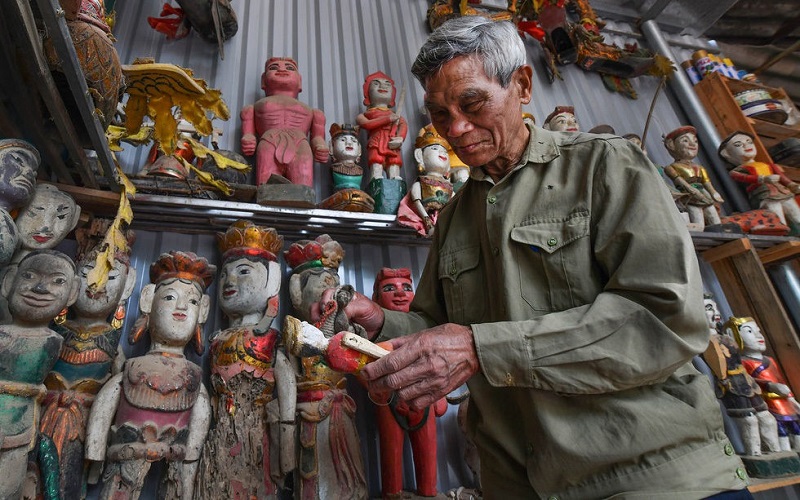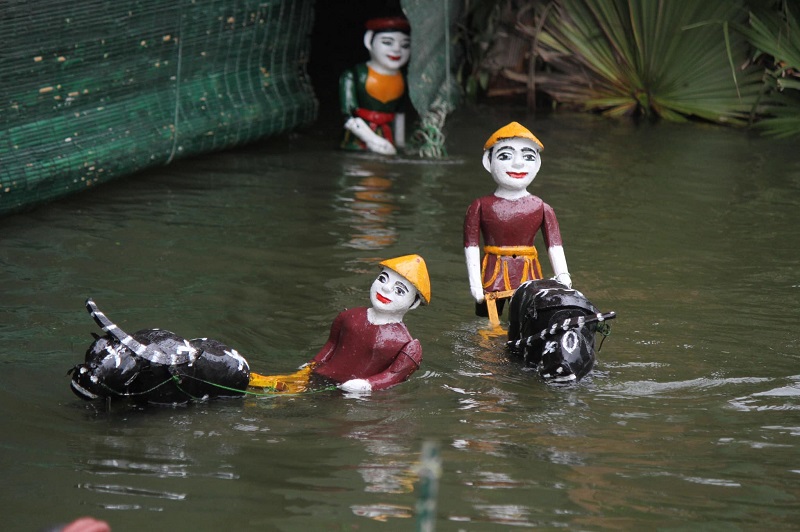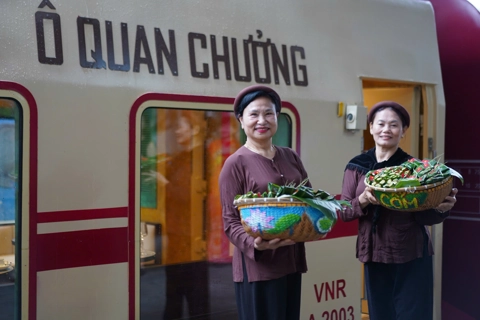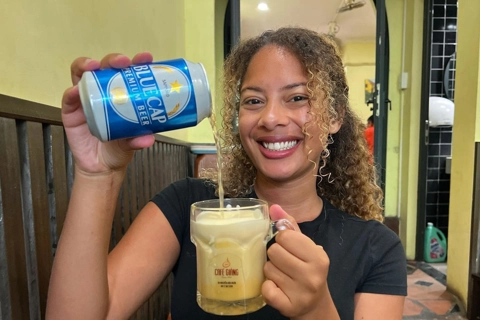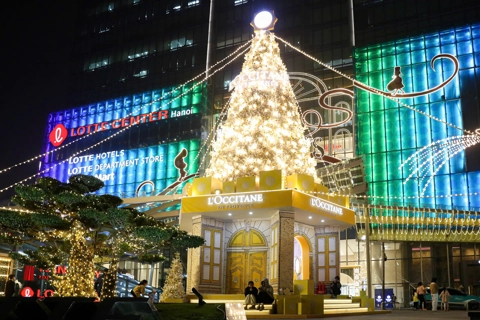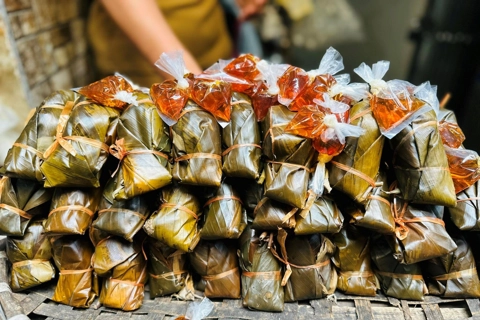[Uniqueness of Hanoi's craft villages] Local artisans preserve and promote Dao Thuc water puppetry
In the outbreak of the Covid-19 these days, the village is closed for visitors. However, artisans are still quite busy practicing traditional and new performances, getting ready for the return of visitors.
Hanoi is renown as a “land of hundreds ancient professions”. Improving product production and quality and promotion is the way for traditional trade villages in Hanoi to adapt to modern life.
The Hanoi Times presents a series of articles, showing how local artisans are striving to promote their forefather’s trades while still preserve the original values.
Water puppetry is a typical form of Vietnamese art, which has existed for more than 1,000 years. Travel experts agreed that it will be a quintessential experience for foreign travelers once they have a chance to visit Hanoi after Covid-19.
| Today's Vietnamese water puppetry is a unique variation of the ancient Asian puppet tradition. Photo: Lang Viet Water Puppetry |
For over 300 years, unique Dao Thuc water puppetry has been known and favored both at home and abroad, thanks to the efforts of passionate artists in preserving and promoting this folk art.
Located in Thuy Lam Commune (Dong Anh District, Hanoi), Dao Thuc Village now has become an interesting destination for foreigners to discover the Red River delta’s culture, especially through water puppetry art. The local artists from families, which for generations have attached with the trade, have made a great contribution to it.
One of them, Dinh The Van started getting to know about this art at the age of five. But in wartime, he left his passion with it to join the army when he was 16. When the war ended and Vietnam reunified in 1975, the soldier returned to his homeland and continued his passion.
However, at this time, it faced many difficulties due to the economic situation and shortage of artists who were dying out. “Seeing the valuable art of the forefathers falling into oblivion was a pain to me so restoring water puppetry was my only dream at that time”, Van stated.
Then he sought out other artisans and met organizations and agencies to call for propaganda and mobilization programs to raise awareness of the villagers about the value of Dao Thuc water puppetry. Thanks to his efforts, dozens of traditional stories for the art have been restored.
“I’m very happy to see many young people today interested in it and learning to become professional performers. They will be the next generation to keep the fire of the art and pass it to the next ones,” he told The Hanoi Times.
| Water puppetry artist Dinh The Van from Dao Thuc Water Puppetry Village, Hanoi |
There are more than ten guilds performing water puppetry in the country today and each has its own feature. Among them, Dao Thuc water puppetry is unique for its stories and characters, according to Nguyen Huu Tu who has performed for over 30 years.
Behind the Thuy Dinh, a replica temple facade of traditional northern architecture set up on a pond surrounded by green trees, puppeteers stand in the waist-deep water and control puppets with bamboo rods, ropes and pulleys, which are hidden underwater to the tunes and beats of the background music.
“It requires a lot of time to learn and practice to perform well. We also have to learn how to handle the cold water, especially in winter. The secret is to have a slice of ginger in your throat,” Tu told The Hanoi Times.
In recent years, more and more tourists have come to our village to see the puppetry performance so it encourages us a lot and we are willing to perform anytime in any weather.”
The increasing number of spectators of Dao Thuc puppetry is thanks to artist Nguyen The Nghi who is making efforts to combine and promote the art with tourism. In early 2000, Vietnam was welcoming more and more foreign tourists as water puppetry, one of the Vietnamese cultural specialties, caught a lot of attention and interest.
Nghi then orchestrated the cooperation between water puppetry guilds and tour operators.
| A water puppetry show in Dao Thuc Village, Dong Anh District, Hanoi |
Being aware of the effect of internet advertisement, Nghi and a group of young artisans made a website and a Facebook page to provide readers with information about Vietnamese water puppetry in general and Dao Thuc puppetry in particular, as well as contact information for those who are interested in the art.
Nghi also designed leaflets to distribute among travel agents and come to them to establish partnerships. He also had the idea to translate the stories into English to serve foreign guests as well as renovate the village’s cultural space to match the stage for the typical countryside landscape.
In 2016, Nghi was elected as head of the Dao Thuc water puppetry troupe for his contribution.
“I never thought I would be responsible for the puppetry guild before. But I was born and grew up in the village, so I wanted to contribute something for it,” he told The Hanoi Times.
In the outbreak of the Covid-19 pandemic these days, the village is closed for visitors. However, artisans are still quite busy making puppets and practicing both traditional and new performances, getting ready for the return of visitors.
“Water puppetry is a special art of Vietnamese villages. However, society is always moving and changing. It is necessary to change the way of thinking and doing to promote it, I think. It is the way for our traditional professions and arts to survive and thrive,” he shared his thought.

